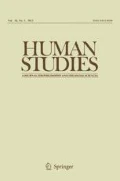Abstract
How are we to understand Agamben’s philosophical anthropology and his frequent invocations of the relation between bios and zoe? In Remnants of Auschwitz Agamben evokes a quasi-phenomenological account of shame in order to elucidate this question thus implying that the phenomenon of shame carries an ontological significance. That shame has an ontological significance is also a belief held in current debates on moral emotions and the phenomenology of intersubjectivity, but despite this common philosophical intuition phenomenologists have criticized Agamben’s account of shame. In this paper, I will try to show how these criticisms often rely on misreadings of Agamben’s (at times rather confusing) terminology. Once Agamben’s analysis of shame have been properly placed in the broader context if his work, I will outline how Agamben’s analysis of shame and his ontology of life feeds into a rethinking of community and belonging.
Similar content being viewed by others
Notes
Carl Schmitt provides us in Politische Theologie with an earlier formulation of this insight: “There is no norm that can be applied to chaos. For the legal order to make sense, the order must be produced. A normal state of things must be created, and the sovereign is the one who definitively decides whether this normal state is really in effect” (Schmitt 2004: 19). In order for there to be a normal state of things, there must be a decision between what is normal and what is not normal. Sovereignty creates a normal state of things by creating the possible exception to this state of things. In this way, sovereignty produces and presupposes a realm of bare life.
And, as we shall see, these two themes are intimitaly linked for Agamben. We get a preliminary sense of this, once we remember the epigraphs to Remnants of Auschwitz: “The remnant shall be saved, even the remnant of Jacob, unto the mighty God” (Isaiah 10: 22) and “Even so at this present time also there is a remnant according to the election of grace.… and so all Israel shall be saved” (Romans 11: 5–26).
Later Heidegger will argue that Grundstimmungen are historically determined dispositions, which might also resonate with Agamben’s genealogical method.
Elsewhere Haugeland also compares this way of reading Heidegger to the late Wittgenstein's concept of Lebensform that Agamben later adopts (Haugeland 2013: 5). Alas, I cannot here go further into a comparison of the concepts of life in Heidegger, Wittgenstein, and Agamben.
References
Agamben, G. (1993). The coming community. Minneapolis: University of Minnesota Press.
Agamben, G. (1998). Homo sacer: Sovereign power and bare life. Stanford, CA: Stanford University Press.
Agamben, G. (2000a). Means without end: Notes on Politics. Minneapolis: University of Minnesota Press.
Agamben, G. (2000b). Remnants of Auschwitz: The witness and the archive. New York: Zone Books.
Agamben, G. (2005a). State of exception. Chicago: University of Chicago Press.
Agamben, G. (2005b). The time that remains: A commentary on the letter to the romans. Stanford, CA: Stanford University Press.
Agamben, G. (2013). The highest poverty: Monastic rules and form-of-life. Stanford, CA: Stanford University Press.
Benjamin, W. (1991). Gesammelte schriften IV. Frankfurt am Main: Suhrkamp.
Calhoun, C. (2004). An apology for moral shame. Journal of Political Philosophy, 12(2), 127–146.
Guenther, L. (2011). Shame and the temporality of social life. Continental Philosophy Review, 44(1), 23–39.
Guenther, L. (2012). Resisting Agamben: The biopolitics of shame and humiliation. Philosophy & Social Criticism, 38(1), 59–79.
Haugeland, J. (2013). Dasein disclosed: John Haugeland’s Heidegger. J. Rouse (Ed.). Cambridge, MA: Harvard University Press.
Heidegger, M. (2006). Sein und Zeit. Tübingen: Niemeyer.
Kant, I. (1974). Kritik der reinen Vernunft. Frankfurt am Main: Suhrkamp.
Locke, J. (2008). An essay concerning human understanding. Adelaide: The University of Adelaide Library. Retrieved May 2, 2018, from http://ebooks.adelaide.edu.au/l/locke/john/l81u.
Sartre, J.-P. (2003). Being and nothingness: An essay on phenomenological ontology. London: Routledge.
Schmitt, C. (2004). Politische Theologie: vier Kapitel zur Lehre von der Souveränität. Berlin: Duncker & Humblot.
Welz, C. (2011). Shame and the hiding self. Passions in Context: International Journal for the History and Theory of Emotions, 2, 82. (Atrocities–Emotion–Self).
Zahavi, D. (Ed.) (2012). Self, consciousness, and shame. In The Oxford handbook of contemporary phenomenology. Oxford: Oxford University Press.
Author information
Authors and Affiliations
Corresponding author
Rights and permissions
About this article
Cite this article
Knudsen, N.K. Shame, Belonging, and Biopolitics: Agamben Among the Phenomenologists. Hum Stud 41, 437–455 (2018). https://doi.org/10.1007/s10746-018-9464-x
Published:
Issue Date:
DOI: https://doi.org/10.1007/s10746-018-9464-x


